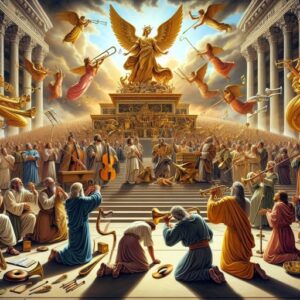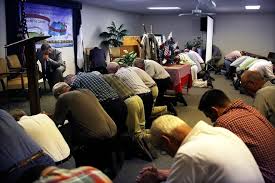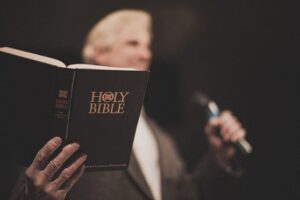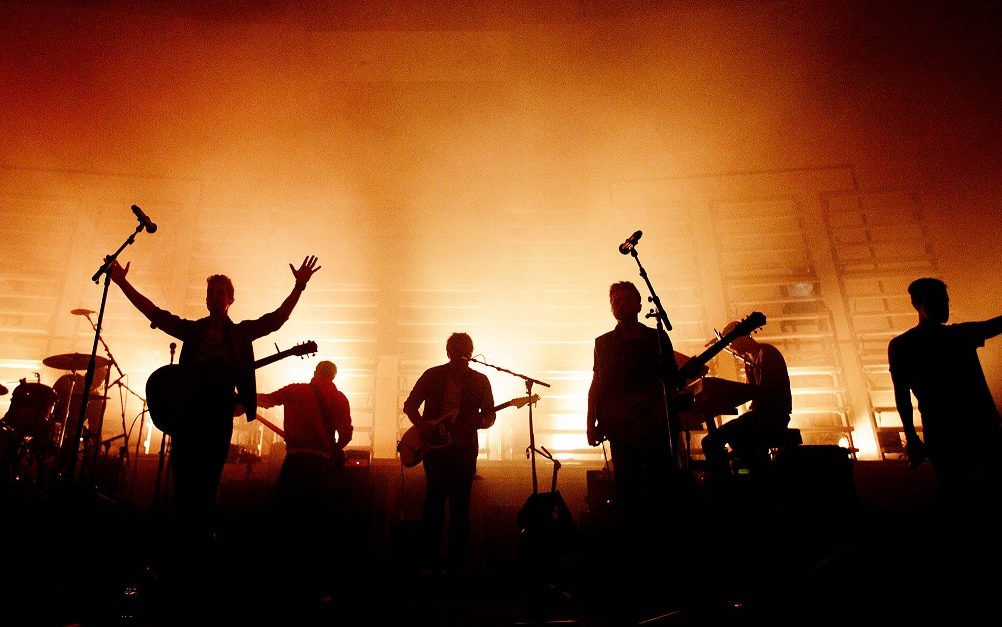One of the greatest doctrinal concerns about fellow New Testament believers today in the world is the perpetual presumption that any use of the word “worship” literally means “singing ‘worshipful’ songs”. Musicians with the volunteer or paid role of the church minstrel are formally recognized as “worship leaders” or “worship pastors”. Entire congregations who are bringing their offerings, volunteering, teaching the Word, helping the needy, and spending time in prayer, and otherwise demonstrating selfless love of God, will stop what they are doing and say, “let’s enter into worship”. This verbiage of “entering into worship” or “doing worship” is universally (in this culture) understood to mean one thing: run to the musical instruments, dim the lights, and do music.the
 This is more dangerous than it is an innocent sidetracking of semantics, and not because there is something wrong with music, because there isn’t anything wrong with music. Let me make myself very clear, there is absolutely nothing wrong, and much that is good, in bringing sincere expressions of adoration and praise to God, even worshiping God, in song and music. The concern that I have regarding this word “worship” is that the true meaning of this term is vitally important to the faith but is utterly and completely destroyed — not innocently lost in translation but deliberately obfuscated by perpetuated habits and an often idolatrous culture.
This is more dangerous than it is an innocent sidetracking of semantics, and not because there is something wrong with music, because there isn’t anything wrong with music. Let me make myself very clear, there is absolutely nothing wrong, and much that is good, in bringing sincere expressions of adoration and praise to God, even worshiping God, in song and music. The concern that I have regarding this word “worship” is that the true meaning of this term is vitally important to the faith but is utterly and completely destroyed — not innocently lost in translation but deliberately obfuscated by perpetuated habits and an often idolatrous culture.
 Perform a Bible-wide search for the word “worship” [click this link] at BibleGateway.com. I reviewed the list of 254 uses of the word English-translated word “worship” in the Bible with the NIV translation, and among all of them I counted exactly three (3) uses of the English-translated word “worship” that are used in the literary context of music. That’s a 3/254 ratio, or 1.2%, of any Biblical affirmation that the words “worship” and “music” were hand-in-hand in literary context.
Perform a Bible-wide search for the word “worship” [click this link] at BibleGateway.com. I reviewed the list of 254 uses of the word English-translated word “worship” in the Bible with the NIV translation, and among all of them I counted exactly three (3) uses of the English-translated word “worship” that are used in the literary context of music. That’s a 3/254 ratio, or 1.2%, of any Biblical affirmation that the words “worship” and “music” were hand-in-hand in literary context.
One of these, 2 Chronicles 29:27–28, reads as follows:
2 Chronicles 29:27–28
27 And Hezekiah commanded to offer the burnt offering upon the altar. And when the burnt offering began, the song of the Lord began also with the trumpets, and with the instruments ordained by David king of Israel.
28 And all the congregation worshipped, and the singers sang, and the trumpeters sounded: and all this continued until the burnt offering was finished.
 Notice that the musicians were doing music, while everyone else was in worship. While this is a beautiful mental photograph of heartfelt, sincere expressions of focused love of God, the association of “worship” with “music” appears to be unique and coincidental because there are multiple other references to the term “worship” in 1 & 2 Chronicles that have no explicit musical context, although some of them do involve idolatry. For example,
Notice that the musicians were doing music, while everyone else was in worship. While this is a beautiful mental photograph of heartfelt, sincere expressions of focused love of God, the association of “worship” with “music” appears to be unique and coincidental because there are multiple other references to the term “worship” in 1 & 2 Chronicles that have no explicit musical context, although some of them do involve idolatry. For example,
1 Chronicles 16:29
29 Give unto the Lord the glory due unto his name: bring an offering, and come before him: worship the Lord in the beauty of holiness.
2 Chronicles 7:18-20
18 Then will I stablish the throne of thy kingdom, according as I have covenanted with David thy father, saying, There shall not fail thee a man to be ruler in Israel.
19 But if ye turn away, and forsake my statutes and my commandments, which I have set before you, and shall go and serve other gods, and worship them;
20 Then will I pluck them up by the roots out of my land which I have given them; and this house, which I have sanctified for my name, will I cast out of my sight, and will make it to be a proverb and a byword among all nations.
 It would seem that the term “worship” means something different here, such as to express focused, devoted attention, love, and submission.
It would seem that the term “worship” means something different here, such as to express focused, devoted attention, love, and submission.
The second case where the word “worship” is used in contextual conjunction with music is in Daniel where idolatry is demanded on behalf of King Nebuchadnezzar and his statue.
Daniel 3:4-6
4 Then an herald cried aloud, To you it is commanded, O people, nations, and languages,
5 That at what time ye hear the sound of the cornet, flute, harp, sackbut, psaltery, dulcimer, and all kinds of musick, ye fall down and worship the golden image that Nebuchadnezzar the king hath set up:
6 And whoso falleth not down and worshippeth shall the same hour be cast into the midst of a burning fiery furnace.
 Music is being used here to denote a signal to worship an idol. “Worship” here is not the act of singing or performing said music.
Music is being used here to denote a signal to worship an idol. “Worship” here is not the act of singing or performing said music.
The third case where the word “worship” is used near any reference to music is in Psalm 100:2.
Psalm 100:2
2 serve the Lord with gladness: come before his presence with singing.
 This scripture verse makes two distinct instructions that compliment each other but are not necessarily the same thing.
This scripture verse makes two distinct instructions that compliment each other but are not necessarily the same thing.
Out of all these 254 uses of the English translated term, not one of them equates worship with “sing songs of adoration to God” or anything related to music. Examples include,
Genesis 22:5
5 And Abraham said unto his young men, Abide ye here with the ass; and I and the lad will go yonder and worship, and come again to you.
Exodus 3:12
12 And he said, Certainly I will be with thee; and this shall be a token unto thee, that I have sent thee: When thou hast brought forth the people out of Egypt, ye shall worship God upon this mountain.
Exodus 8:1
8 And the Lord spake unto Moses, Go unto Pharaoh, and say unto him, Thus saith the Lord, Let my people go, that they may worship me.
Deuteronomy 29:26
26 For they went and served other gods, and worshipped them, gods whom they knew not, and whom he had not given unto them:
Most traditional cultures would know what to do mentally with the word “worship” with any other subject. It may be imagined to be any number of different things including
- praying,
- beholding,
- contemplating,
- yes, singing and dancing in celebration, but most importantly,
- obeying and
- heeding and
- honoring
 There was never any monopoly on the word “worship” for singing, particularly given other objects of idolatry. When was the last time anyone assumed that an Old Testament reference to someone worshipping a false god meant that the idol was “sung to”? Certainly that would be a form of worship, but it is not the default assumption most of us make. Why, then, do we make this assumption today with God?
There was never any monopoly on the word “worship” for singing, particularly given other objects of idolatry. When was the last time anyone assumed that an Old Testament reference to someone worshipping a false god meant that the idol was “sung to”? Certainly that would be a form of worship, but it is not the default assumption most of us make. Why, then, do we make this assumption today with God?
Don’t get me wrong, we are (frequently) instructed to praise God in song.
Colossians 3:16
16 Let the word of Christ dwell in you richly in all wisdom; teaching and admonishing one another in psalms and hymns and spiritual songs, singing with grace in your hearts to the Lord.
Ephesians 5:18–20
18 And be not drunk with wine, wherein is excess; but be filled with the Spirit;
19 Speaking to yourselves in psalms and hymns and spiritual songs, singing and making melody in your heart to the Lord;
20 Giving thanks always for all things unto God and the Father in the name of our Lord Jesus Christ;
 But nowhere in these New Testament scriptures instructing us to make music is the suggestion that this is “worship”.
But nowhere in these New Testament scriptures instructing us to make music is the suggestion that this is “worship”.
In many cases of scripture, literally bowing down on one’s knees to humbly submit to and express surrender and adoration in speech (prayer) is involved.
Genesis 24:26
26 And the man bowed down his head, and worshipped the Lord.
Genesis 24:48
48 And I bowed down my head, and worshipped the Lord, and blessed the Lord God of my master Abraham, which had led me in the right way to take my master’s brother’s daughter unto his son.
Exodus 4:31
31 And the people believed: and when they heard that the Lord had visited the children of Israel, and that he had looked upon their affliction, then they bowed their heads and worshipped.
Exodus 34:8
8 And Moses made haste, and bowed his head toward the earth, and worshipped.
Matthew 2:10–12
10 When they saw the star, they rejoiced with exceeding great joy.
11 And when they were come into the house, they saw the young child with Mary his mother, and fell down, and worshipped him: and when they had opened their treasures, they presented unto him gifts; gold, and frankincense and myrrh.
12 And being warned of God in a dream that they should not return to Herod, they departed into their own country another way.
Matthew 4:8–10
8 Again, the devil taketh him up into an exceeding high mountain, and sheweth him all the kingdoms of the world, and the glory of them;
9 And saith unto him, All these things will I give thee, if thou wilt fall down and worship me.
10 Then saith Jesus unto him, Get thee hence, Satan: for it is written, Thou shalt worship the Lord thy God, and him only shalt thou serve.
Revelation 22:8–9
8 And I John saw these things, and heard them. And when I had heard and seen, I fell down to worship before the feet of the angel which shewed me these things.
9 Then saith he unto me, See thou do it not: for I am thy fellowservant, and of thy brethren the prophets, and of them which keep the sayings of this book: worship God.
 Bowing down. When was the last time you saw any church “worship leader” literally bow down to God in leading the rest of the congregation in worship?
Bowing down. When was the last time you saw any church “worship leader” literally bow down to God in leading the rest of the congregation in worship?
The danger in calling music “worship” is that the proper meaning of the word “worship” is lost and so easily replaced with entertainment and emotional expressions solely through music.
The clearest and indeed the only instructions and definition in the New Testament about the activity of “worship” point away from entertainment and distractions and towards the substance of disciplined focus, pursuing truth, and acts of obedience.
These instructions are found in John 4:24 and Romans 12:1–2.
John 4:24
24 God is a Spirit: and they that worship him must worship him in spirit and in truth.
Romans 12: 1–2
12 I beseech you therefore, brethren, by the mercies of God, that ye present your bodies a living sacrifice, holy, acceptable unto God, which is your reasonable service.
2 And be not conformed to this world: but be ye transformed by the renewing of your mind, that ye may prove what is that good, and acceptable, and perfect, will of God.
 As New Testament believers, this is what the act of “worship” is really all about. It’s about being fully and completely surrendered to the in-dwelling spirit of God, by being holy and striving to please Him, being different from the world which loves idolatrous things like worshipping music itself. Indeed, music itself has become an idol in the American church. Rather than being a tool to signal a time of focus upon and prayer to God, music itself has become the subject of our focus.
As New Testament believers, this is what the act of “worship” is really all about. It’s about being fully and completely surrendered to the in-dwelling spirit of God, by being holy and striving to please Him, being different from the world which loves idolatrous things like worshipping music itself. Indeed, music itself has become an idol in the American church. Rather than being a tool to signal a time of focus upon and prayer to God, music itself has become the subject of our focus.
I enjoy music. I enjoy “worshipful” music. I believe that one can truly worship God in song, and those who “do music” best often do indeed worship. I am not against such things. But I don’t think that music is the best packaging for worship. Kneeling in submission is better. Prayer is better. Reading and obeying the Bible is better. Caring for others is better.
 A real worship leader drops the mic.
A real worship leader drops the mic.
When I was a teenager and in my 20s I tried to “lead worship”, meaning I used to play the guitar and sing, and I thought that the role meant to usher people into God’s presence, but the whole process felt so vain and spotlight-oriented. So ultimately my whole Christian life I have always had a problem with the term “worship leader” as well as the using the term “worship” as an activity to mean something music-related. The term should not even be associated with music — it should be associated with demonstrating selfless love of God. The term “worship leader” should also not be a term anyone should entitle himself with, but at the same time this should be a term we should all be striving to do.
Strive to be a worship leader by demonstrating sincerely loving God with all of your heart, soul, mind, and strength.
https://stimpy77.medium.com/worship-does-not-mean-singing-and-music-5b97cc836131
Jon Davis




